Ford Fusion: Front Seats / Front Seat Cushion Cover. Removal and Installation
Removal
-
Remove the front seat.
Refer to: Front Seat (501-10A Front Seats, Removal and Installation).
-
-
If equipped.
Release the lumbar knob retaining clip and remove the lumbar knob.
-
If equipped.
Release the height adjust handle locking tab and remove the height adjust handle.
-
If equipped.
Release the recline handle retaining clip and remove the recline handle.
-
If equipped.
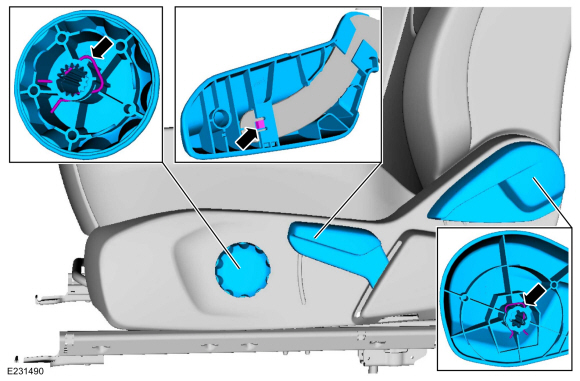 |
-
Remove the side shield screws.
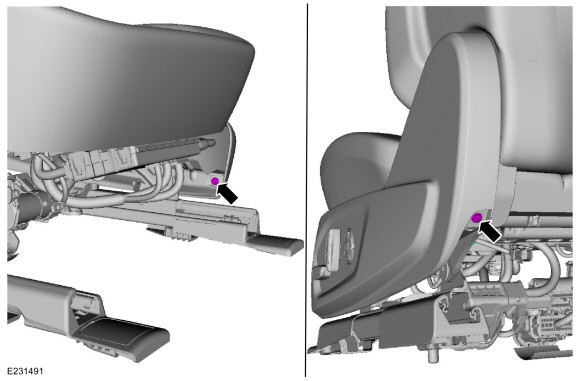 |
-
Driver seat and power passenger seats.
Remove the side shield.
-
Lift up on the rear of the side shield and pull outward.
-
Push the side shield forward.
-
If equipped.
Disconnect the electrical connector.
-
Lift up on the rear of the side shield and pull outward.
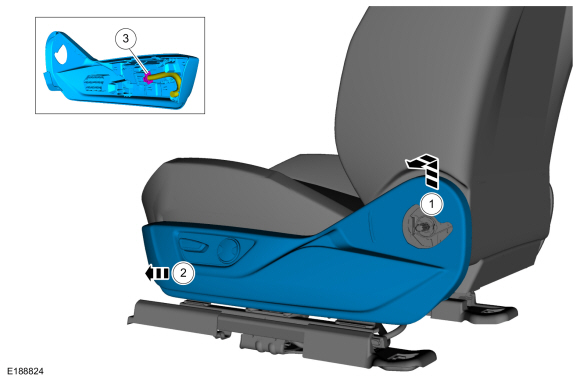 |
-
Passenger manual seat.
Remove the side shield.
-
Pull the rear of the side shield out.
-
Firmly grasp the side shield, lift up and out, separating the side shield from the recliner bracket.
-
If equipped.
From underneath, squeeze the retainers together and pull out on the side shield.
-
Slide the side shield forward.
-
Pull the rear of the side shield out.
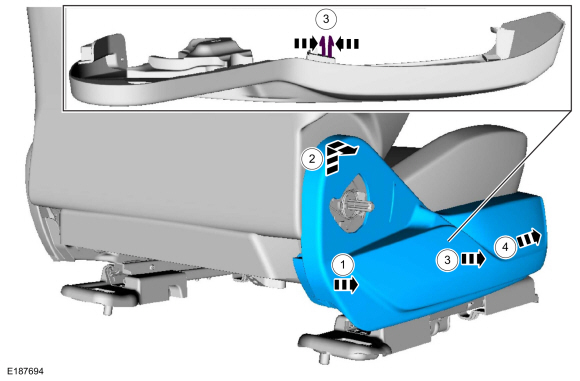 |
Heated seats
-
Disconnect the heated seat electrical connector.
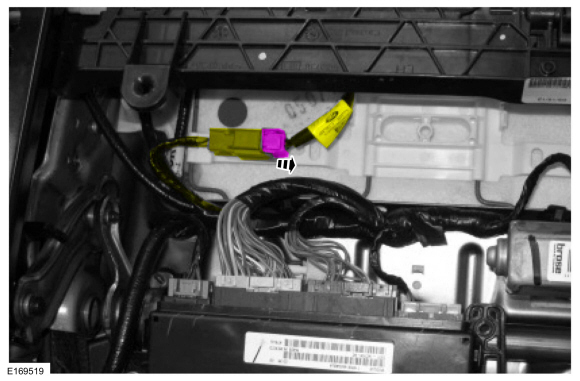 |
All seats
-
NOTE: Power seats shown, others similar.
Detach the electrical connector retainers and position the wire harnesses aside.
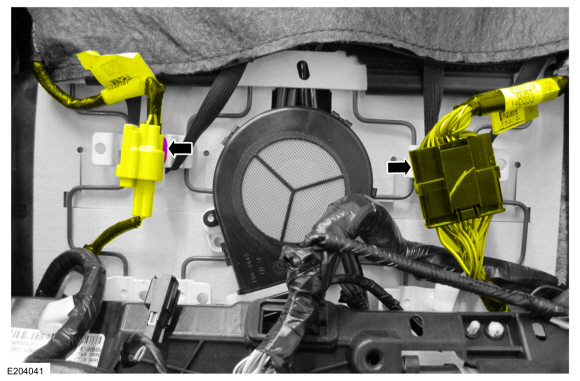 |
-
Detach the backrest cover straps and position the backrest cover upward.
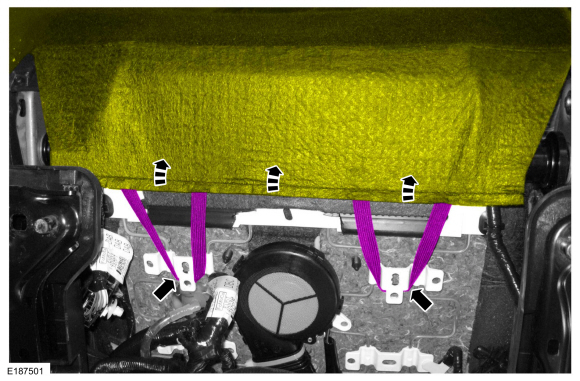 |
-
Detach the J-clips and position the cushion cover aside.
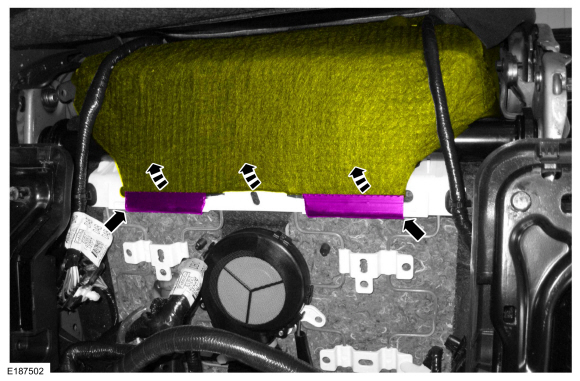 |
-
NOTE: For passenger seats equipped with an OCS service kit, the OCS will be adhered to the bottom of the seat cushion foam.
Release the J-clips and position the front of the seat cushion cover and foam assembly upwards.
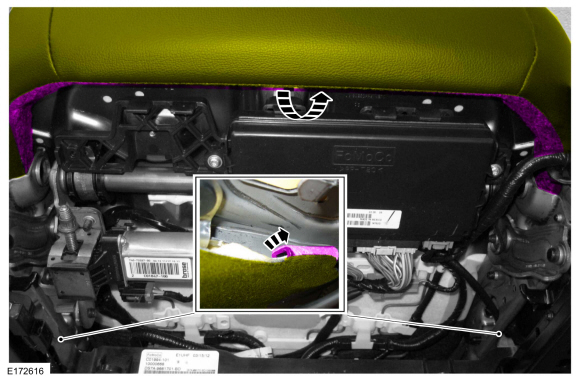 |
Driver seat and passenger seat with OEM (Original Equipment Manufacturer) OCS (Occupant Classification System)
-
Remove the seat cushion cover and foam as an assembly.
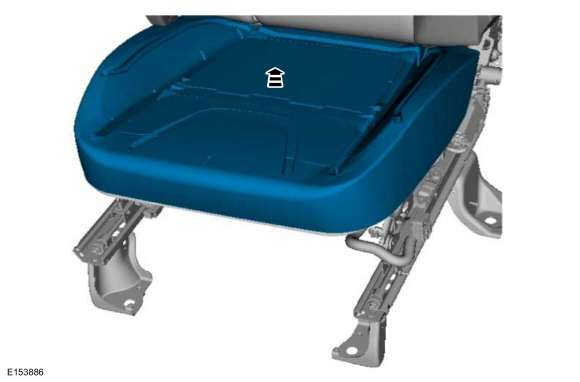 |
OCS service kit
-
NOTE: Follow the unique instructions or graphic for this step in installation.
Disconnect the electrical connector, bend the bracket tab away and slide the OCS sensor off the bracket.
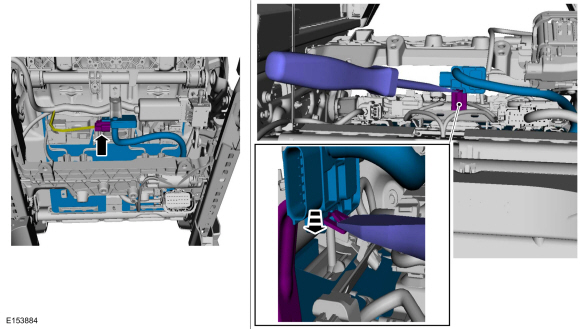 |
-
Remove the OCS pin-type retainers.
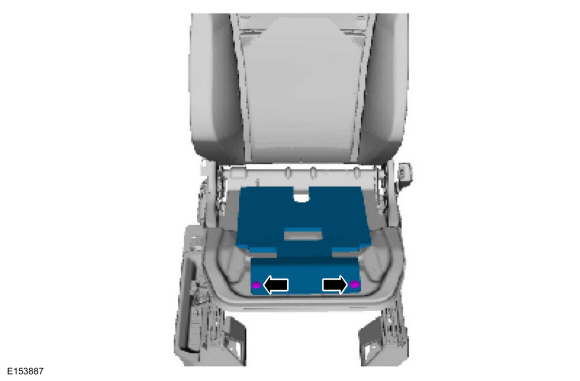 |
-
NOTE: Note the location of the OCS hose and heater mat pigtail (if equipped) as it passes through the seat springs for proper installation.
If equipped.
Route out the OCS hose, sensor and heated seat cushion mat wiring pigtail from between the seat track support wires and remove the OCS and the seat cushion cover and foam as an assembly.
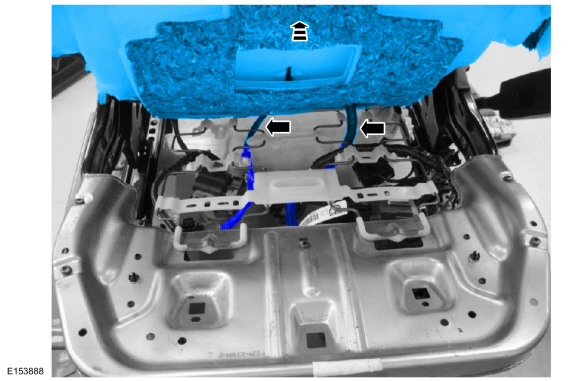 |
All seats
-
NOTICE: Use care when separating the seat cushion from the hook-and-arrow or the hook may be torn from the seat cushion foam.
NOTE: This step is only necessary when installing a new component.
Release the hooks and remove the seat cushion cover.
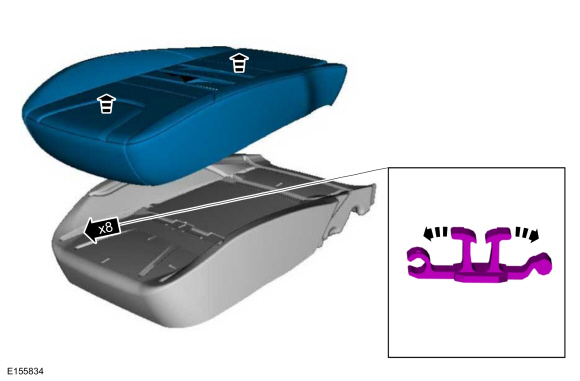 |
Installation
All seats
-
To install, reverse the removal procedure.
Passenger seat
NOTICE: Inspect the OCS bladder, seat cushion pan and support assembly for any foreign objects before installing the OCS to the seat cushion pan. Remove any foreign objects. Failure to follow these instructions may result in incorrect operation of the OCS and may cause system failure.
-
Do not prove out the SRS after installing the seat.
-
Bend the OCS sensor bracket tab back.
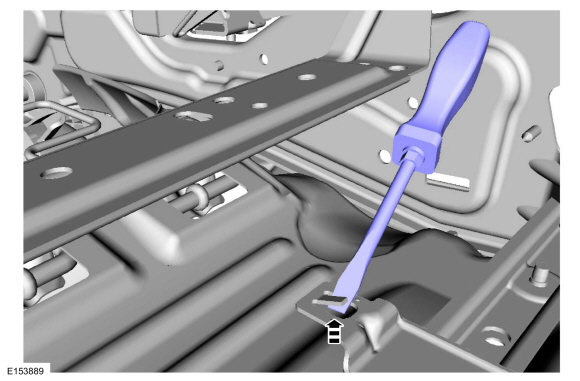 |
-
 WARNING:
Occupant Classification System (OCS) parts are
calibrated as an assembly and must only be replaced in the configuration
they are sold. Never separate parts of an assembly. Failure to follow
this instruction may result in incorrect operation of the OCS and
increases the risk of serious personal injury or death in a crash.
WARNING:
Occupant Classification System (OCS) parts are
calibrated as an assembly and must only be replaced in the configuration
they are sold. Never separate parts of an assembly. Failure to follow
this instruction may result in incorrect operation of the OCS and
increases the risk of serious personal injury or death in a crash.
 WARNING:
Make sure the front passenger seat repair is
complete, the seat and all attached components (head restraint, seat
side shield, etc.) are correctly assembled, and the seat is correctly
installed to the vehicle before using System Reset to rezero the seat
weight. Failure to follow these instructions may result in incorrect
operation of the occupant classification system (OCS) and increases the
risk of serious personal injury or death in a crash.
WARNING:
Make sure the front passenger seat repair is
complete, the seat and all attached components (head restraint, seat
side shield, etc.) are correctly assembled, and the seat is correctly
installed to the vehicle before using System Reset to rezero the seat
weight. Failure to follow these instructions may result in incorrect
operation of the occupant classification system (OCS) and increases the
risk of serious personal injury or death in a crash.
NOTICE: To prevent system failure, take the following precautions before carrying out the OCS reset.
- Make sure the voltage to the OCSM is greater than 8 volts and less than 18 volts.
- Make sure the OCS is not below 42.8 °F ( 6 °C) or above 96.7 °F ( 36 °C) when initiating the OCS reset process. If the vehicle has been exposed to extreme cold or hot temperatures, the vehicle must be exposed and kept at a temperature between 42.8 °F ( 6 °C) to 96.7 °F ( 36 °C) for a minimum of 30 minutes.
- Make sure nothing is present on the passenger seat before and during the OCS reset process.
- Prior to carrying out the OCS reset, make sure a minimum of 8 seconds has elapsed after cycling the ignition switch on.
-
If the first system reset attempt was successful, proceed to prove out the SRS.
-
If the first system reset attempt was not successful, carry out a thorough visual inspection of the OCS
connector and wiring for damage, pressure sensor hose for kinks and or
damage, and seat-related wiring harness and body wiring harness
terminals and connectors for damage. Repair any concerns found and
proceed to the next step.
-
Carry out a second OCS reset. If the second attempt is unsuccessful, install a new OCS service kit.
Refer to: Occupant Classification System (OCS) Sensor (501-20B Supplemental Restraint System, Removal and Installation).
-
Prove out the SRS
by turning the ignition from ON to OFF. Wait 10 seconds, then turn the
ignition back to ON and monitor the airbag warning indicator with the
airbags installed. The airbag warning indicator illuminates continuously
for approximately 6 seconds and then turns off. If a SRS fault is present, the airbag warning indicator will fail to light, remain lit continuously, or flash.
-
-
If a SRS
fault is present, the airbag warning indicator either fails to light,
remains lit continuously or flashes. The flashing may not occur until
approximately 30 seconds after the ignition has been turned from OFF to
ON. If this occurs, diagnose and repair any SRS faults before proceeding with other repairs.
-
If, after the ignition has been turned on for 30
seconds, the airbag warning indicator remains unlit with no chime or SRS message displayed in the message center, no SRS fault is present.
-
If the airbag warning indicator is inoperative and a SRS
fault exists, a chime sounds in a pattern of 5 sets of 5 beeps or a
message displays in the message center. If this occurs, diagnose and
repair the airbag warning indicator and any SRS faults before proceeding with other repairs.
-
If a SRS
fault is present, the airbag warning indicator either fails to light,
remains lit continuously or flashes. The flashing may not occur until
approximately 30 seconds after the ignition has been turned from OFF to
ON. If this occurs, diagnose and repair any SRS faults before proceeding with other repairs.
-
Using a diagnostic scan tool, clear all Continuous
Memory Diagnostic Trouble Codes (CMDTCs) from all modules.
 Front Seat Cushion Blower Motor. Removal and Installation
Front Seat Cushion Blower Motor. Removal and Installation
Removal
All seats
Remove the front seat.
Refer to: Front Seat (501-10A Front Seats, Removal and Installation).
Remove the side shield screws...
 Front Seat Lumbar Assembly. Removal and Installation
Front Seat Lumbar Assembly. Removal and Installation
Removal
Remove the front seat.
Refer to: Front Seat (501-10A Front Seats, Removal and Installation).
If equipped.
Release the lumbar knob retaining clip and remove the lumbar knob...
Other information:
Ford Fusion 2013–2020 Service Manual: Luggage Compartment Lid Release Switch. Removal and Installation
Removal Remove the luggage compartment lid moulding. Refer to: Luggage Compartment Lid Moulding (501-08 Exterior Trim and Ornamentation, Removal and Installation). Release the luggage compartment lid release switch. Installation To install, reverse the removal procedure...
Ford Fusion 2013–2020 Service Manual: Direct Current/Direct Current (DC/DC) Converter Control Module. Diagnosis and Testing
Diagnostics in this manual assume a certain skill level and knowledge of Ford-specific diagnostic practices. REFER to: Diagnostic Methods (100-00 General Information, Description and Operation). DTC Chart: Direct Current/Direct Current (DC/DC) Converter Control Module DTC Description Action B1310:11 Run/Start Control: Circuit Short To..
Categories
- Manuals Home
- 2nd Generation Ford Fusion Owners Manual
- 2nd Generation Ford Fusion Service Manual
- Pre-Collision Assist (IF EQUIPPED)
- Starter Motor. Removal and Installation
- Memory Function
- New on site
- Most important about car
Fuel Quality
Choosing the Right Fuel
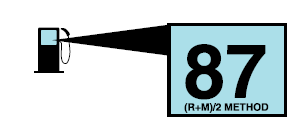
Your vehicle is designed to operate on regular unleaded gasoline with a minimum pump (R+M)/2 octane rating of 87.
